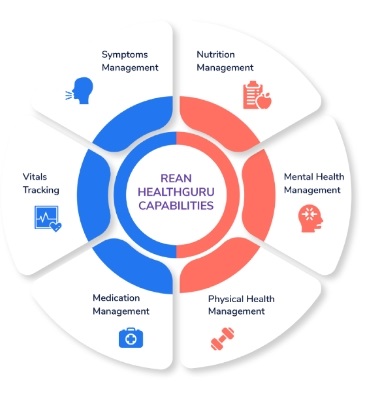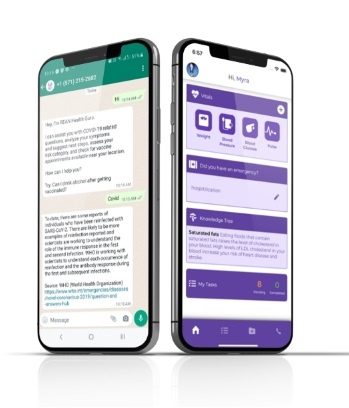Striving to Meet the Unmet Needs of Patients to Drive Better Outcomes
Last two years have been a good learning experience at the REAN Foundation. I want to share my learning and get your feedback on how we can do better to increase the impact of our mission.
REAN started with care at home in mind, mostly catering to individuals suffering from chronic conditions (primarily Non-Communicable Diseases - NCDs). Since we launched in the midst of COVID in early 2020, we were quickly sent to the drawing board to consider communicable diseases as well. How can an organization so young and small tackle such a huge problem? We decided to use two broad principles with patients in mind to address the combined need.
- Identify unmet needs of patients in the care spectrum that may not be addressed by the mainstream.
- Focus on the fundamental building blocks that can be used to build value-added, health condition-specific services customized for each patient.
The Unmet Needs

Thanks to the healthcare leaders (public and private sector) and media, it is amply clear and well accepted that health inequity is a major issue around the world and is only growing in spite of the pumping billions of dollars into the health systems. Why is so much money not making things better or by some measures even making things worse? In a nutshell the answer is that most of us only care about our health (reactively) while we are sick.The providers (physicians and hospitals) also have limited resources and incentives to care for us while we are healthy (i.e keep us from getting sick). Most of us lead a busy life with little time to focus on staying healthy and preventing disease, this results in us getting sick. We then visit a provider and get well, and then return to our busy lifestyle that makes us sick again. This vicious cycle seems impossible to break. How can we convert this to a virtuous cycle?
We started by looking at what we see as a Triple-A problem - Awareness, Access and Adherence.
- Awareness - Focusing on making individuals aware of their specific health risks so that they can be more proactive about their health. For e.g. 60% of children in Africa and India are anemic, resulting in weakness and inability to learn during their young-adolescent years and the problem gets worse as the girls reach the maternity stage. Majority of the children are not aware of this very preventable problem. The lack of awareness exists even among my well educated friends in high-tech jobs living in advanced countries. Many wonder why a healthy well-exercised 50 year old male suffers a heart attack? That is caused because of the lack of awareness about the genetic predisposition to high levels of cholesterol which requires a lot more awareness and discipline than exercise alone. Although exercise helps a lot, it is not sufficient in such a population.
- Access - Once we realize the risk of a health-condition we seek access to care and get the necessary (acute or ambulatory) care and advice on how to stay healthy. Understandably, the majority of the resources in public and private healthcare are focused on providing access to care and the majority of the money is transacted here.
- Adherence - Whether we learn to care for our health because circumstances put us there proactively or reactively, adhering to the advice is the biggest challenge and we believe it is the biggest determinant of successful outcome. For e.g. I learned about my genetic predisposition to high levels of cholesterol and I have been asked to take Statin (a generic) for the rest of my life. The medicine works effectively to lower cholesterol levels if I have the discipline to take it every day but it is as difficult as keeping any good habit in life. It takes a lot of self-discipline especially as our lives get busier day by day. While adherence is the biggest determinant of outcome, providers can do little about individuals not following through with the advice.
At REAN, we believe the focus on awareness and adherence (where there is relatively less money and therefore less focus) to drive better outcomes. We believe a focus on awareness and adherence to advice keeps us healthy and puts us on a virtuous cycle.
Let us now discuss the fundamental building blocks that we learned were necessary to drive better results. We will then talk about our delivery method with concrete examples on how we are beginning to make a difference.
Fundamental Building Blocks
 We set out to learn what is the least common denominator to educate individuals and drive adherence. We found that the management of communicable and chronic conditions rely on managing medication, vitals, symptoms, nutrition, physical, and mental health. For e.g. it is important to monitor blood oxygen (vital) and shortness of breath (symptom) for a communicable disease like COVID while a chronic disease such as Heart Failure would require monitoring weight (vital) and chest pain (symptom).
We set out to learn what is the least common denominator to educate individuals and drive adherence. We found that the management of communicable and chronic conditions rely on managing medication, vitals, symptoms, nutrition, physical, and mental health. For e.g. it is important to monitor blood oxygen (vital) and shortness of breath (symptom) for a communicable disease like COVID while a chronic disease such as Heart Failure would require monitoring weight (vital) and chest pain (symptom).
The north-star for us is to give each individual the awareness they need just when they need it and more importantly, help them adhere to their medical advice with little or no effort on their part. Ideally, everything will be taken care of for them as they go about living their lives - for e.g. their watch or cell phone will detect variations in symptoms and vitals and keep track of whether they have taken their medications.
We understand that we are set out to solve an impossible problem but we take pride and happiness in doing our part to move the needle as much as we can. We are not reinventing what companies like Apple, Samsung, Google etc are doing. Our goal is to take these existing innovations and work with major scientific research organizations such as American Heart Association (AHA) and Amazon Web Services (AWS) Health Equity Initiative to make affordable (hopefully free) solutions for anyone that wants to benefit from them. The early versions of these solutions are rudimentary but we feel good about the progress we are making to eventually provide valuable solutions downstream.
Delivery and Progress to Date
We have already established the importance of tech innovations (wearables and devices) and the need for health condition related scientific knowledge from a research based organization such as AHA. The third and perhaps the most important part of the success is partnering with a field based organization focused on customizing and translating the science to community and driving outcomes in the community. Typically such organizations have social health workers and an established care delivery process to drive outcomes.
Last year has been a very good learning experience trying to apply the REAN HealthGuru platform that supports the primary building blocks to various health conditions working closely with our partner organizations.
- Working with the PEN-Plus team to solve the healthcare problems faced by the poorest billion pollution in the world.
- Working with Dayanand Medical College on the Maternal and Child Health (MCH) initiative.
- Working with Blood Warriors on helping people with chronic blood conditions like Thalassemia and Sickle Cell disease.
- Working with PATH and SNEHA on adolescent mental health challenges.
- Working with Heart and Stroke Foundation of South Africa to mitigate Cardiovascular health challenges.

What Next
We have been big believers in conversational interfaces (e.g. WhatsApp/Chat) from day one because we get to meet the customer where they interact with their friends and family every day. We also like to listen to them in their language and understand their intention as opposed to asking them to learn our apps/services. We are happy to see the advances in this space with the capabilities like ChatGPT but there are a lot of challenges to overcome in translating this to community service that helps a common person with their unmet healthcare needs. We would greatly appreciate any help/support you can offer in helping us solve this problem. It could be in the form of contributing your knowledge in technology and/or medical science to address conditions that you care about in your family or community.
You are welcome to visit the REAN Foundation website and use our open-source code in your projects and help us improve its capabilities. You can also scroll down this email and access the open source code by clicking the link shared at the bottom
About The Author



